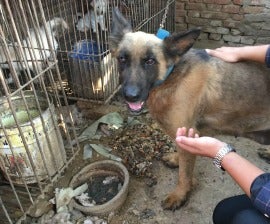-

The whale sanctuary proposal is gaining momentum. Vicki Beaver/iStockphotography
Update, October 27, 2016: Delegates voted in favor of:
- a resolution to formally recognize the important role that whales play in looking after the health of the marine environment, as well as the loss to marine ecosystems resulting from declining whale populations
- a resolution to strengthen the review process for whaling under “special permit,” a provision under Article VIII of the International Convention for the Regulation of Whaling under which Japan has since 1987 issued to itself a permit to kill whales for scientific research
- an urgent draft resolution by the USA to save Mexico’s vaquita porpoise (thought to be the most critically endangered cetacean species in the world, with only an estimated 59 animals remaining in the Upper Gulf of California) from extinction.
Our fight to save whales from commercial whaling continues after a proposal to establish a South Atlantic sanctuary for whales failed this week at the International Whaling Conference, which is still in progress in Portorož, Slovenia. A host of nations far from the South Atlantic voted against the proposal, urged on by Japan, which defied a 2014 International Court of Justice ruling earlier this year that sought to end whaling in the southern ocean whale sanctuary.
Some 70 percent of the almost three million whales killed globally during the 20th century were taken in the southern hemisphere. The designation of a sanctuary in those waters would be the best way to make amends for this sad history of exploitation. The HSUS and Humane Society Internationalhave been at the front lines of the fight against commercial whaling since the early 1970s, and we’re on the ground in Slovenia fighting for whales.
Please support our efforts to protect wildlife.
Among the most pressing issues that are before us now, the preservation of the IWC’s commercial whaling ban against the attempts of Japan and others to undermine it remains paramount. The global moratorium, implemented 30 years ago, has likely saved tens of thousands of whales, and it has isolated the three nations that continue to whale — Iceland, Japan, and Norway — as outliers.
The safety and well-being of whales is also threatened by many factors apart from whaling — things like ship strikes, bycatch, entanglement, marine debris, and toxic pollution. Fortunately, the IWC has expanded its work to address these threats in recent years, and become a strong example of an international body that has evolved with the times to meet pressing needs. The positive agenda of the IWC, through its scientific committee and other channels, underscores the genuine transformation of the organization since the days when animal advocates aptly dubbed it “a club for whalers.”
This year’s meeting of the IWC, which has steadily shifted toward whale preservation, marks not only the 30th anniversary of the moratorium but also the 70th anniversary of the treaty that established the IWC, making this a good time to take stock of its achievements. Unfortunately, given the continuing influence of Japan in its bilateral relationships with a large number of nations in Africa and the Caribbean, there are still some limits to the progress whale protectionists can achieve at IWC. But the good news is, the whale sanctuary proposal is gaining momentum in other quarters. In September 2016, the International Union for the Conservation of Nature (IUCN) affirmed its support for a whale sanctuary in the South Atlantic Ocean, a position reiterated by an IUCN representative at Portorož.
Champions of the sanctuary proposal include all of the range nation states bordering the South Atlantic, like Argentina, Brazil, Gabon, South Africa, and Uruguay, which have passed strong national legislation to protect whales and marine ecosystems near their shorelines. In recent years they’ve also added a true management plan to their proposal, laying out the way such a sanctuary might work for all. The proposed sanctuary, encompassing known breeding grounds for all large whale species in the South Atlantic Ocean, would prevent the direct commercial take of cetaceans.
Japan is the biggest global problem for whales, and that’s an issue we’ll continue to confront to bring this island nation into the growing community of states that want to preserve and protect the largest animals who have ever lived on our planet. Donate now to help marine and other animals.











